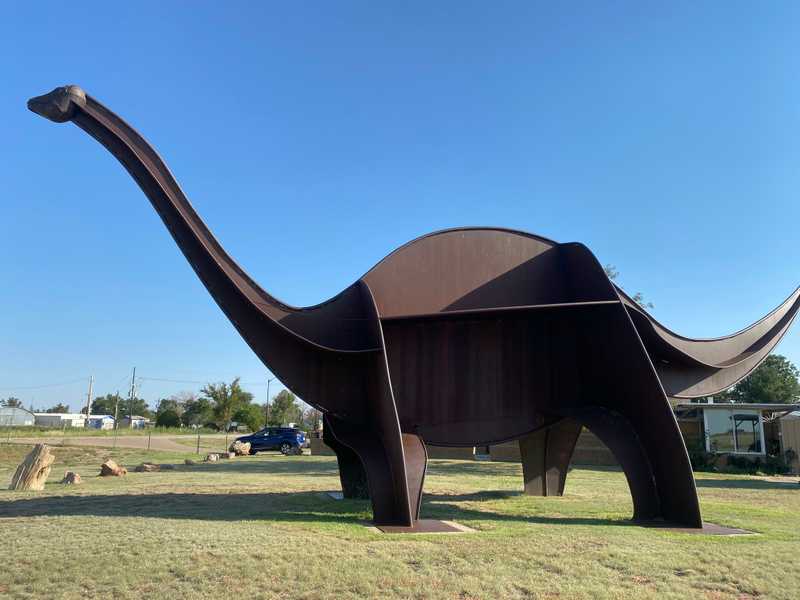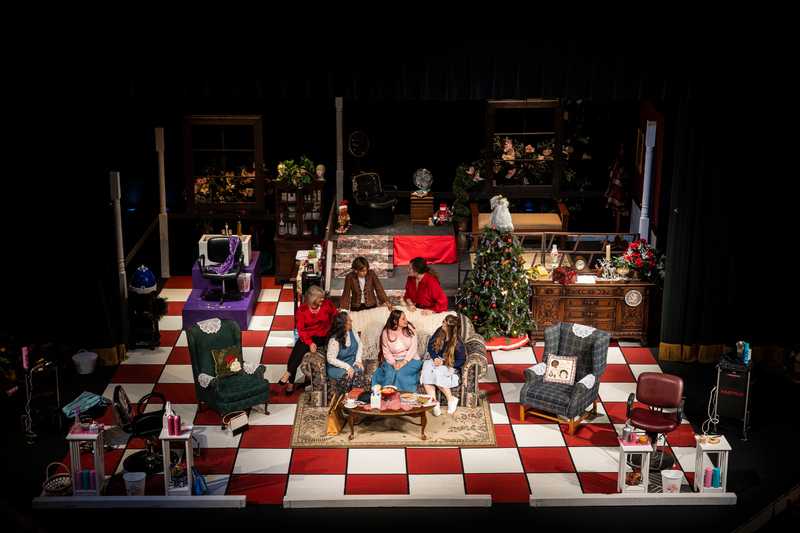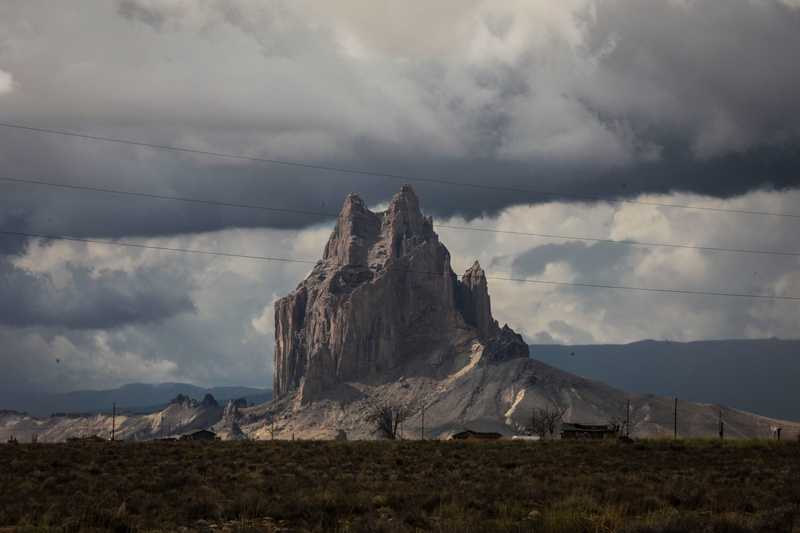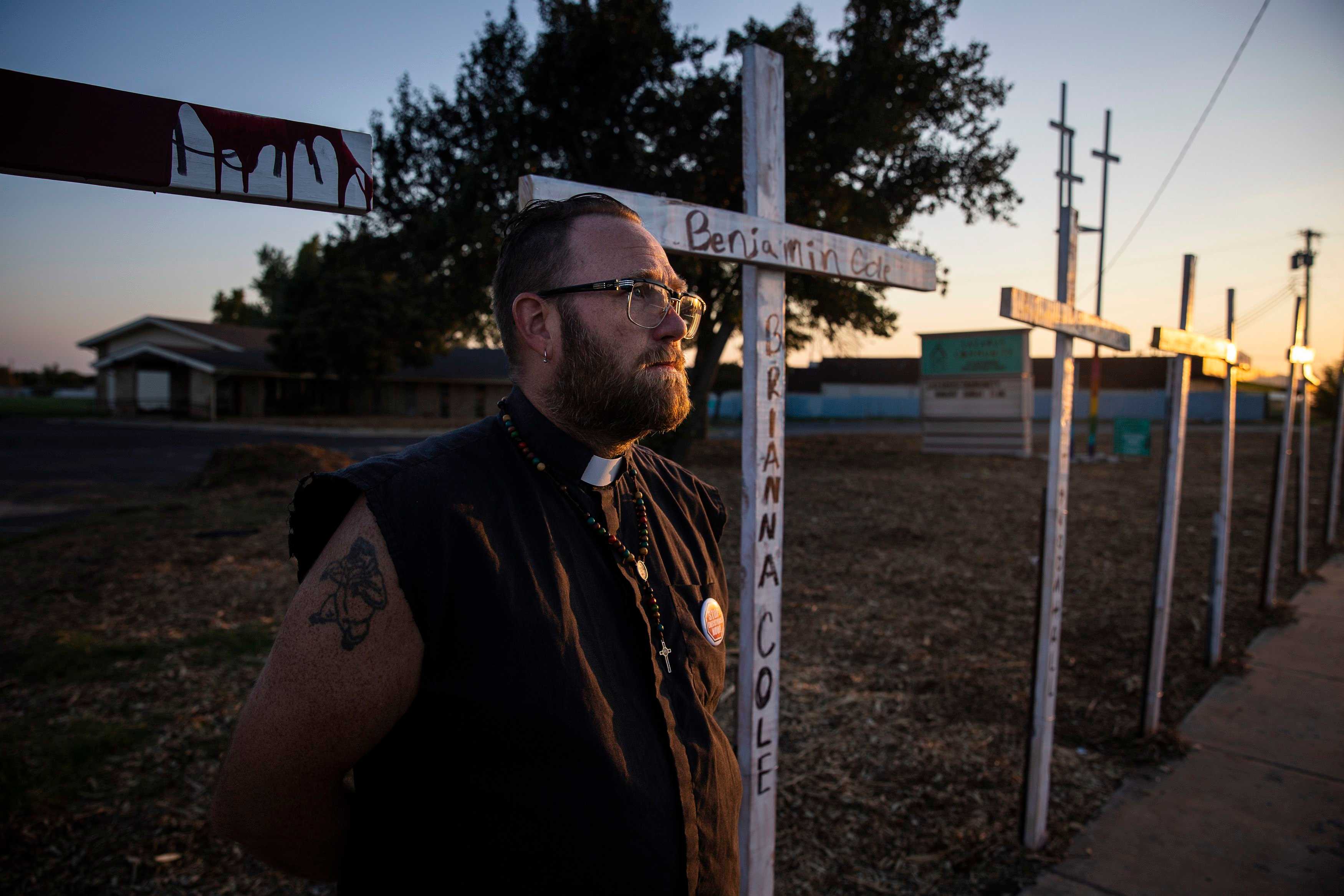
Los Angeles team
Oct. 27, 2022
As Oklahoma races to set execution dates, a pastor holds a quiet — but lurid — protest
OKLAHOMA CITY — On a parched stretch of highway, across from a loan agency and a car wash, 25 wooden crosses stood alongside four lanes of traffic.
Twenty four of them were white. The 25th was splattered blood red, paint obscuring the name that had been written on it a few days before: James Coddington, a death-row inmate executed by the state of Oklahoma on August 25th.
Less than a week earlier, the Rev. Bo Ireland, pastor of Clark Memorial United Methodist Church, had erected the 7-foot crosses in front of his church. Each stands for one of the men the state plans to execute before the end of 2024 — at an average pace of one a month. Ireland has watched aghast as Oklahoma and its governor, Kevin Stitt, have pursued the death penalty with a zeal unmatched by almost any other state.
“If we’re really following Christ, I believe we’re called to take a stand,” he said.
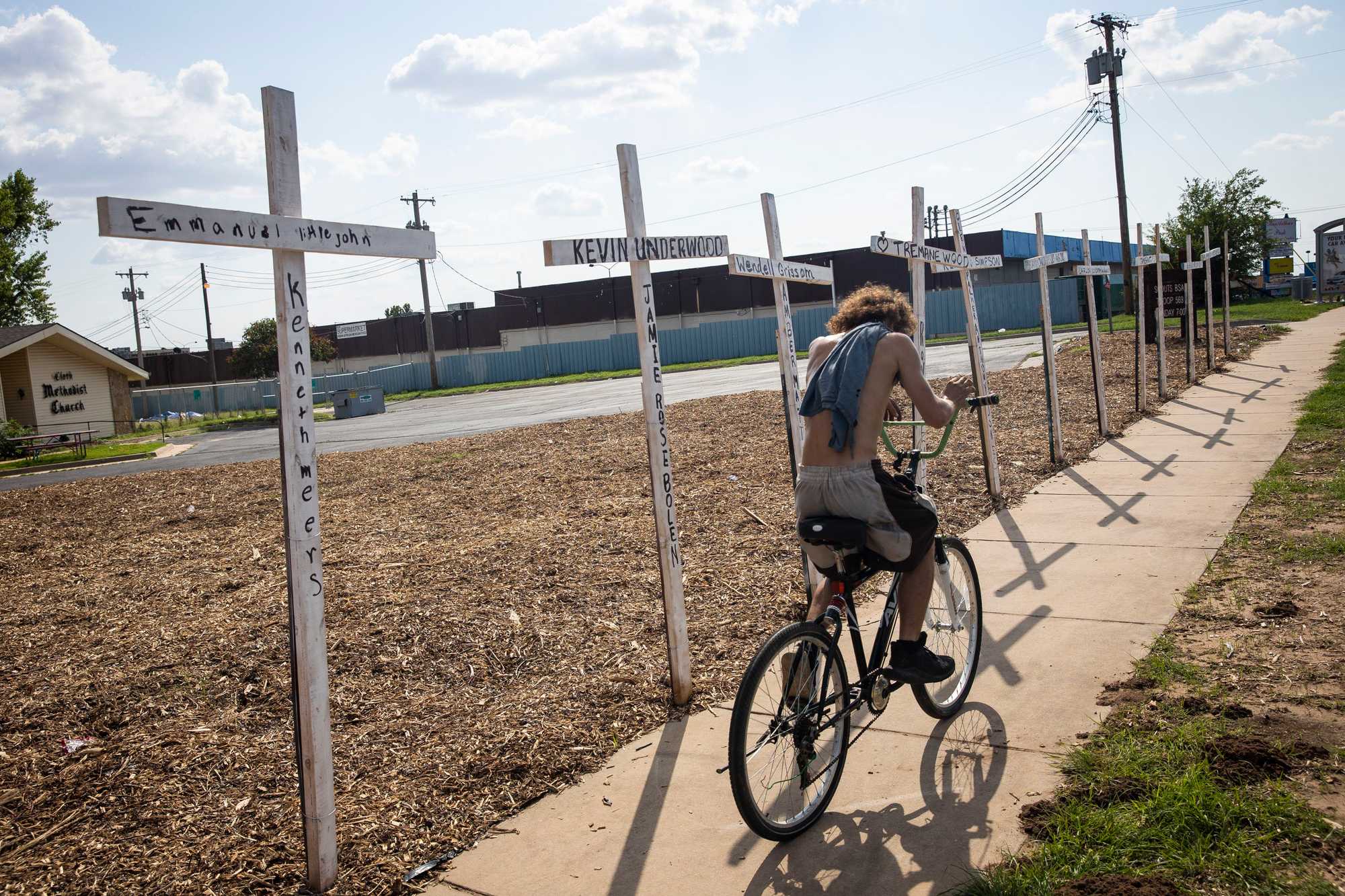
Recent stories from the Los Angeles team
Oklahoma is racing to set execution dates after a federal judge ruled in June that the combination of drugs the state uses to kill does not amount to cruel and unusual punishment. Under particular scrutiny was the sedative midazolam, which critics say does not reliably prevent pain: In a 2014 execution in Arizona, for instance, a man struggled for breath for nearly two hours before he died.
When the idea for the crosses was suggested to Ireland by a group called Oklahoma Coalition to Abolish the Death Penalty, he had a decision to make. He knew that the crosses might evoke strong reactions in Oklahoma, where support for the death penalty remains high. But, he said, his role in the church allows him to speak out when other people might not be able to.
“I think there are a whole lot of people out in this world right now that are afraid to stand up and instead hold their voice back,” Ireland said, squinting at the crosses in the sun. “I think they’re afraid of their neighbor. I think they’re afraid of family members. I think they’re afraid of politicians. I’m not afraid of any of that. I’m accountable to God. And that’s it.”
Tom Hibbitts, 80, worked with another volunteer to build the crosses in just a day. Hibbitts said his opposition to the death penalty is simple: “Thou shalt not kill.” He gestured to his Vietnam veteran hat. “You can see where I’ve been. I’ve killed.” His voice broke. “It’s hard for me to get over. Real hard. But I know God will forgive me if I ask for it.”
When a person is executed, Ireland and his volunteers will cover the cross bearing their name — and the names of their victims — in red paint, a shade called Cherry Cola. If someone is reprieved, he plans to paint their cross a bright green, a color that Ireland said stands for life.
Ireland’s congregants, many of whom are transient or homeless people in the area, have been supportive of the protest. But the larger community has been a different story. He gets angry voice mails chastising him, he said, and sometimes worse.
He was most profoundly shaken by the contents of a manila envelope he received after holding a vigil for Coddington, who in 1997 killed his friend and co-worker Albert Hale. On the outside of the envelope someone had written in blue cursive, “You should be ashamed. What color would you paint these? Maybe you can display them.” Inside were graphic photos from the crime scene.
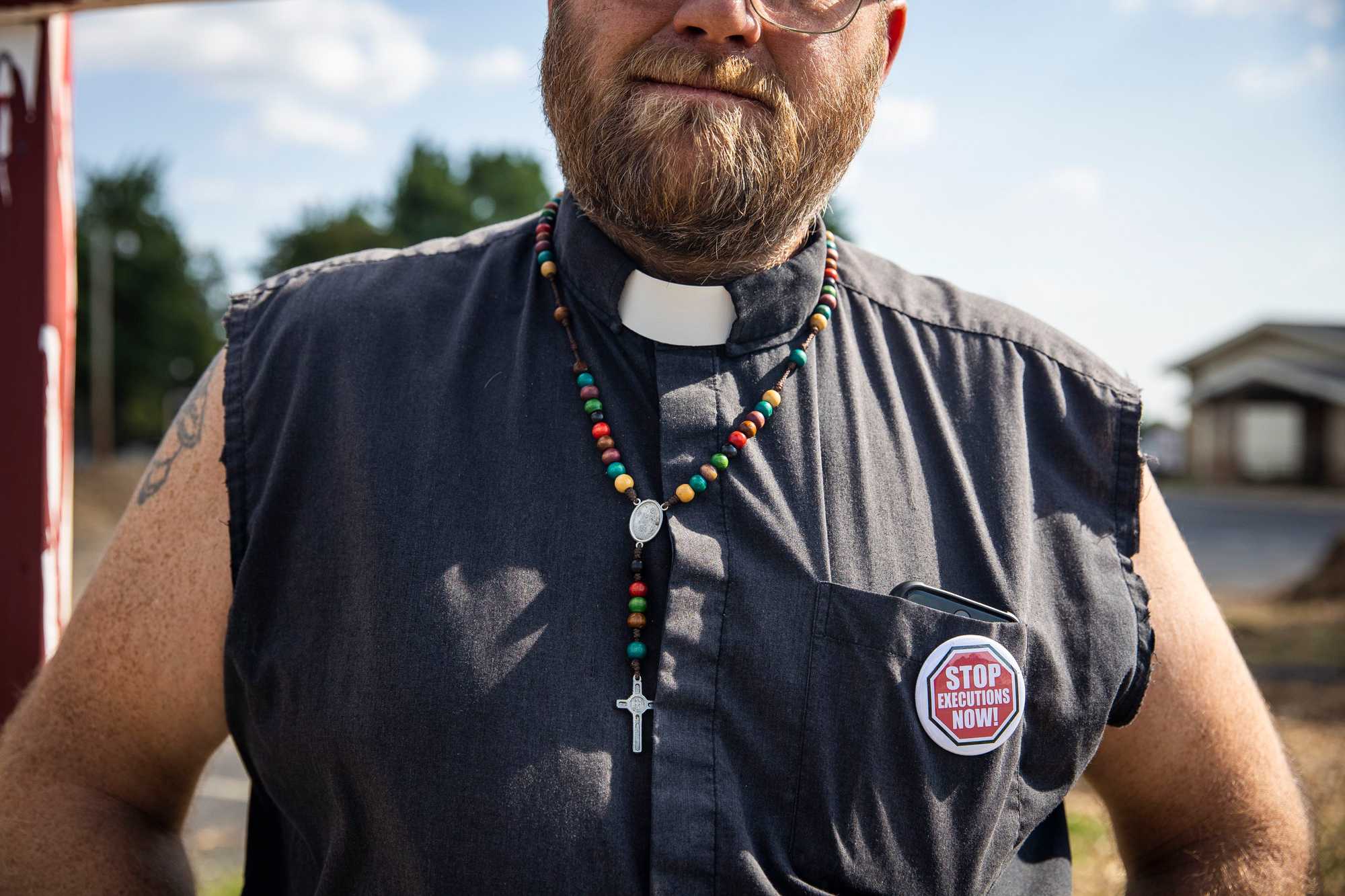
It took a few days until Ireland could bear to sift through the images. He asked a friend to look at them first. “And then on a day when my heart was not as heavy, I opened them,” he said. “I prayed over each photo. I prayed for their family. I prayed for James Coddington and his family.”
He has kept them close ever since. “I pray over them often.”
Ireland did not always oppose the death penalty. He was raised in West Texas, he said, “in a family that said we should bring back public hangings.” It was the experience of ministering to people in prison that changed his mind. “Many of the people that I had met were changing their lives and really trying to do a whole lot better than what they’re condemned of. That’s what changed my heart.”
The contents of the anonymous package devastated Ireland, but didn’t shift his position. He believes someone such as Coddington, who expressed remorse, did his “very utmost to seek forgiveness.” But even if that were not the case, Ireland believes that as long as someone is alive, there is always the opportunity for redemption — an opportunity that execution removes. “The death penalty denies the power of God to bring someone back.”
Since the Globe’s visit in September, Oklahoma has also executed Benjamin Cole. Richard Fairchild is scheduled to be executed on November 17.
Join the discussion: Comment on this story.
Credits
- Reporters: Julian Benbow, Diti Kohli, Hanna Krueger, Emma Platoff, Annalisa Quinn, Jenna Russell, Mark Shanahan, Lissandra Villa Huerta
- Photographers: Erin Clark, Pat Greenhouse, Jessica Rinaldi, and Craig F. Walker
- Editor: Francis Storrs
- Managing editor: Stacey Myers
- Photo editors: William Greene and Leanne Burden Seidel
- Video editor: Anush Elbakyan
- Digital editor: Christina Prignano
- Design: Ryan Huddle
- Development: John Hancock
- Copy editors: Carrie Simonelli, Michael Bailey, Marie Piard, and Ashlee Korlach
- Homepage strategy: Leah Becerra
- Audience engagement: Lauren Booker, Heather Ciras, Sadie Layher, Maddie Mortell, and Devin Smith
- Newsletter: LaDonna LaGuerre
- Quality assurance: Nalini Dokula
- Additional research: Chelsea Henderson and Jeremiah Manion
© 2022 Boston Globe Media Partners, LLC
